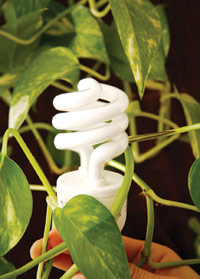As one local energy-conservation expert observed, "green" has become the latest fashion and the coolest trend. Businesses and governments want to make sure their customers and constituents know they're being green, even when their efforts don't add up to much when you look more closely. Ditto for "sustainability," another concept that's been commercialized and turned into a status symbol, according to more than one of the local experts Xpress quizzed.

"Sustainability isn't something to be had; it's a way we have to live," said Charlie Hopper, a longtime landscaper who partnered with a tech pal to create an iPhone application that's a mobile database of tree species (see "Botany Buddy: Plant Info For Your iPhone," Oct. 28 Xpress). Hopper, who majored in political science and philosophy in college, called sustainability "a false notion," remarking, "Nothing is sustainable. If you take 'utopia' and translate it from the Latin, it means 'nowhere.'"
If a landscaper designs a beautiful yard with native plants, rain gardens and other "green" touches, and then the homeowner loses his job and can't afford to maintain the yard — "That's not sustainable," said Hopper. "We have to start making sustainable choices, and consider what's the smallest impact we can make on the environment and still get what we need."
When Xpress asked Asheville GreenWorks Director Susan Roderick what being green means to her, a look of astonishment conveyed that she thought the answer should be obvious: "Trees!" The nonprofit started as (and still is) a tree-planting environmental group — Quality Forward — Roderick reminded us. But probing the thought more deeply, she echoed Hopper's point about choices: "I'm converting the upstairs of my [big Montford] house to an apartment. I don't need all that space. It's not sustainable!" She also joked, "Being green doesn't mean trading in your perfectly good car for a Prius."
RiverLink's Hartwell Carson pondered the question a moment, before saying, "It means something different to everyone, and everyone's trying to use 'green' to mean whatever they want it to mean. Being green, to me, means having as light of a footprint as you can." The French Broad Riverkeeper for the nonprofit, Carson emphasized, "One thing people forget about is their impact on water quality: You forget that when your can of oil leaks on the driveway, it gets washed away when it rains, and it ends up in our streams and river. Or when you take a long shower, you're wasting water."
Does he take short showers?
"I do, but really short, military three-minute showers aren't the total solution for Americans," he replied. Carson recommends doing better at recycling the natural resource, by collecting rainwater to water our lawns and flush our toilets, instead of wasting drinking water for those purposes.
Asheville-based climate expert Drew Jones said that each year, he tries "to do something that is meaningful and a little more green." In the last seven years, his family has switched out incandescent light bulbs for compact fluorescents, added insulation to their house, installed a solar hot-water and heating system, and set up power strips to cut off "phantom loads" to appliances that aren't in use. Jones has estimated a 42-percent reduction in energy use at his house since moving there in February 2002.
"My latest thing is solar, wind-powered clothes drying." Jones paused for effect, then explained: "A clothesline. No electricity. No natural gas. For me, I'm standing outside looking at the blue sky, standing in my garden. I'm slowing down. It's not going to work for us, long-term, to dig coal out of the West Virginia earth."
Sustainability and being green "is a way of living that's consistent with supporting the natural systems on which life depends."
But individual efforts like Jones' are just part of the answer, said building analyst Marcus Renner. He spoke to Xpress as we sipped some organic, fair-trade coffee, but observed that — given Jones' point that we get most of our electricity from fossil fuels — "The heat to warm this coffee is probably unsustainable. So … should we stop drinking coffee?"
Such fine points demonstrate the quandary we're in, Renner argued.
The 35-year-old admitted he's been a bit pessimistic about our chances of stopping, much less reversing, global warming. "Everything the scientists have predicted, such as melting ice caps, has happened, only twice as fast," said Renner. "But we're not doing anything about it, and [our] children will be dealing with what we've created."
Reversing course, he said, will take concerted efforts on three fronts: First, on a personal level, each of us have to cut our energy use and reduce our carbon footprint by two-thirds. "Second, we've got to get the government involved to take drastic action, and third, we have to spread the word. As individuals alone, or groups and countries acting independently, we're not going to be able to do it."
The United States can "lead the globe" in addressing climate-change issues, said Renner. "We've done amazing things when we've put our minds to it, as we did in World War II, with the Victory Gardens and Rosie the Riveter. We have to start getting serious, and we need to pressure our lawmakers to make it happen."
Send your environmental news to mvwilliams@mountainx.com or call 251-1333, ext. 152.



Before you comment
The comments section is here to provide a platform for civil dialogue on the issues we face together as a local community. Xpress is committed to offering this platform for all voices, but when the tone of the discussion gets nasty or strays off topic, we believe many people choose not to participate. Xpress editors are determined to moderate comments to ensure a constructive interchange is maintained. All comments judged not to be in keeping with the spirit of civil discourse will be removed and repeat violators will be banned. See here for our terms of service. Thank you for being part of this effort to promote respectful discussion.